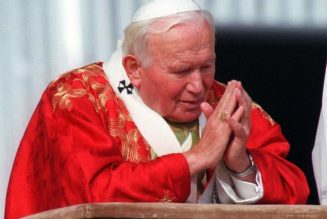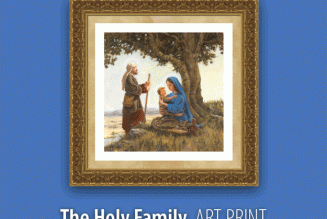
Liturgically, the Church marks the birth of St. John the Baptist — the only saint whose birth is celebrated aside from the Blessed Virgin Mary — once a year (June 24), but also does so every day.
Every morning in the Liturgy of the Hours, the Canticle of Zechariah (Luke 1:68-79) is included, which the father of John the Baptist sang upon his birth. At Vespers, the Magnificat (Luke 1:46-55), Mary’s song of praise, recalls the time when Elizabeth was carrying the Baptist in her womb. From the rising of the sun to its setting, the Church attends liturgically to the birth of the Baptist.
Both Zechariah and Mary recall the promises made to Abraham. Likely Zechariah thought long about that. When the Archangel Gabriel told him that he and Elizabeth were to have a son, Zechariah enquired how that could be, given their advanced age. As a result, Zechariah was struck mute until the birth of the Baptist.
Zechariah’s question was similar to Mary’s at the Annunciation (Luke 1:34), but similar words can express different thoughts. Zechariah’s question apparently stemmed from unbelief (Luke 1:20), and so he was punished.
Zechariah would thus have thought about Abraham in his enforced silence. For when Abraham is told that he and Sarah will have a son, he “fell on his face and laughed” (Genesis 17:17). But the Lord does not silence Abraham for the same — but more intense — reaction that Zechariah had. Perhaps Zechariah was expected to have learned from Abraham’s experience.
Sarah also laughed at the promise of a son (Genesis 18:11-15) and her laughter does not please God. He enquires as to why she laughed and Sarah denies that she did.
So laughter can mean different things, just as the same words can convey different meanings, depending upon tone, timing and expression.
All of which comes to mind given the recent audience granted by the Holy Father to an international group of comedians, including Americans Whoopi Goldberg, Jimmy Fallon, Chris Rock, Jim Gaffigan and Conan O’Brien. Pope Francis spoke to them of how humor is essentially human, and that “wisdom” (sapiens) is related to laughter (ludens). He addressed the vocation of comedy, as it were, in generous terms:
“You remind us that homo sapiens is also homo ludens! For playful fun and laughter are central to human life, to express ourselves, to learn, and to give meaning to situations. … You denounce abuses of power; you give voice to forgotten situations; you highlight abuses; you point out inappropriate behavior. You do this without spreading alarm or terror, anxiety or fear, as other types of communication tend to do; you rouse people to think critically by making them laugh and smile. You do this by telling stories of real life, narrating reality from your unique viewpoint; and in this way, you speak to people about problems, large and small.”
A wise preacher, a good teacher, a kind employer, a gentle friend, a courageous journalist, a brave protestor — all of them know that humor can be the most effective way to make a point, to correct a fault, to inspire a response.
Pope Francis too went back to Genesis, but not to the passage where Sarah denied her laughter under God’s questioning.
“Sarah conceived and bore a son in her old age, at the time that God had set. Then Sarah said, ‘God has made laughter for me; everyone who hears will laugh over me,’ (Genesis 21:6),” Pope Francis said. “That is why they named their son Isaac, which means, ‘he laughs.’ Can we laugh at God? Of course, we can, and this is not blasphemy, we can laugh, just as we play and joke with the people we love.”
It depends, of course, on what kind of laughter it is. Abraham fell down laughing, perhaps in wonder at the astonishing turns of Providence. Sarah laughed and denied it. God provides the happy laughter of a child, which is shared with her kinsfolk and friends.
Thus laughter is not unambiguous. Everyone knows that there is a great difference in laughing with someone, and laughing at someone. Sharing a joke is rather different being made the object of one.
Pope Francis alluded to that, saying that “the laughter of humor is never ‘against’ anyone, but is always inclusive, purposeful, eliciting openness, sympathy, empathy.”
That’s the ideal, a humor that shares and uplifts. Humor — and especially contemporary stand-up comedy — can also divide, ridicule, insult and degrade. Some of the most gifted practitioners of such corrupted comedy were sitting right in front of Pope Francis. Indeed, some of them — Chris Rock comes to mind — would find it hard to find a single joke in their routines that could be repeated in a wholesome family environment, let alone the Apostolic Palace.
Julia Louis-Dreyfus, also on hand for the papal audience, starred in a show, Veep, in which almost every joke was a combination of vulgarity and debauchery, intended to belittle, insult and humiliate. There was precious little laughing within Veep; the show invited its audience to laugh at others, cruelty masquerading as comedy.
There was, perhaps for that reason, no audience participation component to the meeting with the Holy Father.
The comics seemed genuinely touched by the invitation. Jimmy Fallon and Stephen Colbert spoke about it on air when they returned. Colbert said that he often wondered if his comedy work was compatible with his Catholic faith.
“Does God like my comedy?” asked Colbert, in a serious moment. It is a question any artist or craftsman ought to ask.
Colbert then had an animated God appear to answer the question, with God going on to comment upon the comedic aspect of duck genitalia. So it is also a possibility that God doesn’t like Colbert’s comedy on the grounds that it isn’t funny.
John the Baptist’s life was marked at the beginning and the end by the different purposes to which performances can be put. His beheading came after a dance led Herod to make a rash and foolish promise. But the Baptist performed, too — like David dancing before the Ark of the Covenant — when Mary came to visit Elizabeth, leaping for joy in the womb.
Laughter, dance, song — they can uplift or degrade, lead to God or away from him. It’s a message as old and Abraham and Sarah — and current as contemporary comedy.









